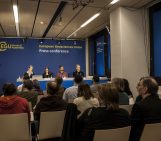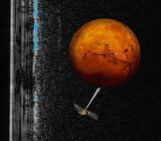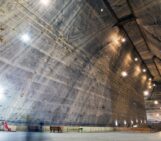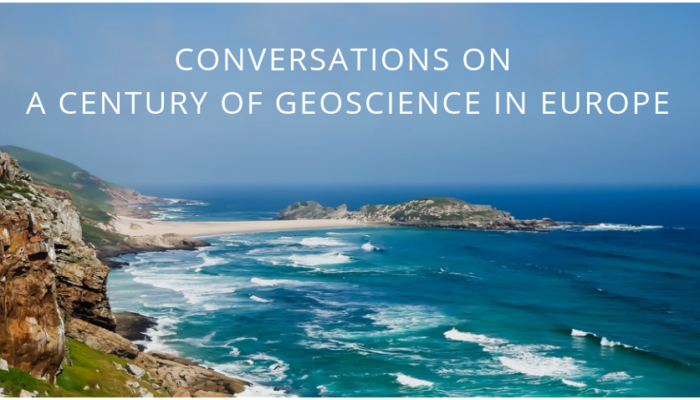
Over the last century, geoscientists have made incredible contributions to our understanding of the Earth, the solar system, and beyond. Inspired by the American Geophysical Union (AGU) and the International Union of Geodesy and Geophysics (IUGG) centennials, which are celebrated in 2019, we would like to highlight Europe’s role in shaping the geosciences and the great achievements of European geoscientists within the last century.
In this series of interviews, scientists reflect on the last 100 years of Earth, space and planetary sciences in Europe and share their perspectives on the future.
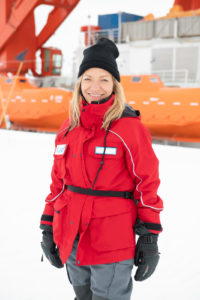 Antje Boetius: Director of the Alfred Wegener Institute (AWI) Helmholtz Center for Polar and Marine Research and Professor of Geomicrobiology at the University of Bremen
Antje Boetius: Director of the Alfred Wegener Institute (AWI) Helmholtz Center for Polar and Marine Research and Professor of Geomicrobiology at the University of Bremen
In your opinion, what are some of the biggest ways Europe and European scientists have shaped the geosciences within the last century?
These days, when we are about to launch our large international drift expedition MOSAIC (Multidisciplinary drifting Observatory for the Study of Arctic Climate) to study the Arctic polar night, I often think about the late 19th/early 20th century polar and oceanographic expeditions. Many of these were carried out by European scientists, and often in international teams, just think Nansen, Amundsen, Scott, Wegener, Nobile, Wüst, Agassiz and many more.
Amazing how these missions, and the books and papers they produced, have shaped our image and imagination of the extreme and remote areas of the Earth System. As a child, I was fascinated to read about such adventures, in which Earth seemed like a foreign planet. When one reads the original reports and letters, we can learn how relevant expeditions and fieldwork were – and still are – for the international, collaborative spirit of the geosciences worldwide.
The amazing thing is, in many ways we have remained explorers of our own planet Earth even today. Especially for us polar scientists and oceanographers, there are whole landscapes to be discovered under the ice sheets and ocean. This is also true for the subsurface realm, where we yet have to unravel the limits of life. Going even deeper, I think of the amazing contributions of Europeans to the knowledge and hypotheses about the structure, functioning and dynamics of deep Earth, such as the work of Inge Lehmann and Alfred Wegener.
Which European researcher from the last century has influenced your work the most?
Hard to name a single one, and to limit myself to geoscientists and Europeans here – I never think much in such categories. There are so many important influences, depending on which line of research I think about. Currently my work has a lot to do with assessing and communicating climate change impacts on polar regions, the oceans and all life in general. Then I think of course about the visionary works of Vladimir Vernadsky, James Lovelock, G.E. Hutchinson, Paul Crutzen, Hans Oeschger and the many significant others who discussed an Earth system that both shapes and is shaped by life, including humanity, ultimately resulting in the concept of the Anthropocene.
For the next generation of researchers, what skills/technology/concepts do you think will be the most important for advancing the next century of geoscience?
In my opinion it is the same set of skills as ever before: curiosity, independent thinking, a hunger for life-long learning and crossing borders in the sense of interdisciplinarity and intercultural experience, and an ability to combine methods by teamwork (for example experiments, observations and simulations). Of course, today a challenge is that all of this also needs to be transferred into the digital dimension, which may allow for a lot of extra freedom and opportunities, but needs a good understanding of the new culture of digitality in data, computation and communication, including rigorous quality control.
What do you think will be the biggest challenges for the geosciences in the next century?
The geosciences remain an area where substantial discoveries are possible by basic research, some call it ‘blue sky’ research. It is interesting how direct basic research can be societally relevant, applied and political in these times, in this generation where our decisions as to which CO2 path we will take will shape Earth and nature for generations to come. So it will be challenging for the young generation of geoscientists to realize how important their knowledge will be, and how important it is to communicate it, to stand up for the scientific facts and be clear what they mean for our future. Having said this, I think that geoscience needs to be much more inclusive and international. There are many countries on Earth where basic education in geosciences as well as high quality university training are difficult to gain, and places where women are excluded from this field of study. No country on Earth can afford a lack of diversity of geoscientific knowledge and infrastructure in the times to come.
Interview by Olivia Trani, EGU Communications Officer
You can find more of our interviews on a century of geoscience in Europe here.

